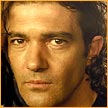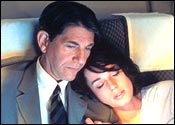
|
The passions of Antonio Banderas
Include Frida and Femme Fatale
|
Arthur J Pais
"I don't really worry about my film career," Antonio Banderas says with passion.
There are many Hollywood stars, he says, who spend days plotting what their next film should be, and worrying how accepting a particular role could affect their careers.
Banderas says many have asked him, one of the biggest stars produced by the Spanish movies, why he takes up seemingly light films like the Spy Kids movies. Banderas, who played the revolutionary Che in the hit 1996 musical Evita, has one key criterion in choosing a film project.
"I take up films I hope to enjoy working in," says the actor who now lives in Hollywood with wife and actress Melanie Griffith. "I had a blast making those movies." The first Spy Kids, which was critically well received, grossed about $180 million, and became his highest grossing film. The sequel, Spy Kids 2, which has opened in America and England, has already grossed about $90 million.
Banderas will soon be seen in Frida, the much-discussed drama about the Mexican artist.
"Me, I am a guy from a Spanish village," Banderas says, chatting with reporters at the Toronto international film festival. Hollywood has not affected him as such, he says, adding he decided to move to Hollywood more "as a personal reason", since Griffith and her children from a previous marriage live in the tinsel town.
Banderas was in Toronto to promote veteran filmmaker Brian De Palma's eagerly awaited crime thriller Femme Fatale, which closed the TIFF with a gala screening on Saturday. A hot ticket at the fest, Femme Fatale is De Palma's tribute to such film noir classics as The Maltese Falcon and Double Indemnity, and opens November 8 across America.
Banderas's intriguing character is perceived as a paparazzi by the ruthless and ever-conniving jewel chief played by Rebecca Romjin-Stamos who is on the run after a heist has gone kaput.
De Palma said one of the best things he loves in Banderas is his down-to-earth and commonsense approach. During their initial discussions, Banderas came to him with detailed notes about how he (Banderas) would play the role. The director gave him a patient hearing but told him as much as he found Banderas' interpretation interesting, it was far from his own vision.
"Thereafter, I completely surrendered to him," Banderas says, adding that even as he had taken up the project, he was in 'awe' of the director. His own suggestions came out of his passion for his project. But when he realised it clashed with the director's vision, he knew what he had to do.
Now, having seen the completed Femme Fatale, Banderas, says he was more than right to have completely surrendered to the director.
De Palma readily admits stars do not always have a complete idea where they are headed in his films. Naturally, says the director known for such hits as Untouchables, his responsibility becomes even more imposing. "I do not want to make a film that would surprise them in the end because their characters and the film looks bad," he says.
 De Palma says the thought of setting part of Femme Fatale in Cannes came last year when he was walking down the red carpet at the Cannes film festival with his girlfriend covered with jewellery. When the paparazzi began to click their cameras, De Palma was suddenly hit with the idea to make the film even more dramatic than in the original script: "I thought why don't I make a film with a diamond heist at the Cannes film festival."
De Palma says the thought of setting part of Femme Fatale in Cannes came last year when he was walking down the red carpet at the Cannes film festival with his girlfriend covered with jewellery. When the paparazzi began to click their cameras, De Palma was suddenly hit with the idea to make the film even more dramatic than in the original script: "I thought why don't I make a film with a diamond heist at the Cannes film festival."
Banderas, who is convinced that the film will be an audience pleaser, is heading for Brazil to work in a political film to be directed Bruce Beresford. "Thousands of people disappeared in Brazil during the military rule, and there are many important stories to be told," he says.